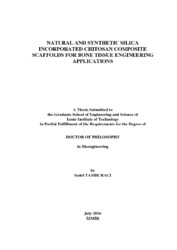Please use this identifier to cite or link to this item:
https://hdl.handle.net/11147/4851| Title: | Natural and Synthetic Silica Incorporated Chitosan Composite Scaffolds for Bone Tissue Engineering Applications | Other Titles: | Kemik Doku Mühendisliği Uygulamalarına Yönelik Doğal ve Sentetik Silika Katkılı Kitosan Kompozit Doku İskeleleri | Authors: | Tamburacı, Sedef | Advisors: | Tıhmınlıoğlu, Funda Havıtçıoğlu, Hasan |
Keywords: | Biomaterials Bone tissue Chitosan Silica Tissue scaffolding |
Publisher: | İzmir Institute of Technology Izmir Institute of Technology |
Source: | Tamburacı, S., (2016). Natural and synthetic silica incorporated chitosan composite scaffolds for bone tissue engineering applications. Unpublished doctoral dissertation, İzmir Institute of Technology, İzmir, Turkey | Abstract: | Recently bone tissue engineering studies have focused on the development of 3D scaffolds that can organize the tissue regeneration in natural way with appropriate porosity and reinforced the structure. Natural polymer-based composites have been focused with more attention than synthetic polymer composites for bone tissue engineering applications because of their biocompatibility and biodegradability. In this work, the goal was to combine the useful biomaterial properties of both chitosan and silica to design biocomposite organic/inorganic biomaterials for bone tissue engineering applications. The composite scaffolds were fabricated by freeze drying method bu using two different silicas; natural silica; Diatomite and synthetic silica, octa (tetramethylammonium) polyhedral oligomeric silsesquioxanes (OctaTMA-POSS). The effects of silica type and loading on the mechanical, morphological, chemical, surface properties, wettability and biocompatibility of composite scaffolds were investigated and characterized by using SEM, AFM, contact angle analysis, swelling study, protein adsorption assay, biodegradation and biomineralization tests. WST-1 cytotoxicity, cell proliferation with rezasurin and alkaline phosphatase activity assays were performed to determine biological activity of the composite scaffolds. In vitro biomineralization on scaffolds was determined by Von Kossa and Alizarin red staining. POSS and diatomite incorporation increased the surface roughness. Chitosansilica composites exhibited 82-90% porosity. Wet chitosan-silica composite scaffolds exhibited higher compression moduli compared to pure chitosan scaffold in 67.3- 81.4kPa and 78.1 to 107.6kPa range respectively. Average pore size range of chitosandiatomite and chitosan-POSS composite scaffolds was obtained as 15-180μm and 220- 300μm, respectively. Results indicated that chitosan-silica composites did not show any cytotoxic effect on 3T3, MG-63 and Saos-2 cell lines. Chitosan-silica composites were found to be favorable for osteoblast proliferation. Diatomite and POSS incorporation showed promising effects with enhancing ALP activity on hFob cells. Therefore, these composite scaffolds could be used for bone tissue engineering applications. Son dönemde kemik doku mühendisliği çalışmaları uygun poroziteye ve güçlendirilmiş yapıya sahip, doku rejenerasyonunu organize eden üç boyutlu yapı iskeleleri üzerinde yoğunlaşmıştır. Kemik doku mühendisliği uygulamalarında doğal polimer bazlı kompozitler biyouyumlu ve biyobozunur özellikleri yüzünden sentetik kompozitlere göre daha çok ilgi çekmektedir. Bu çalışmada amaç, kitosan ve silikanın faydalı biyomalzeme özelliklerini biaraya getirerek kemik doku mühendisliği uygulamalarına yönelik inorganik/organik biyokompozit biyomalzeme tasarlamaktır. Kompozit yapı iskeleleri iki farklı silika kaynağı; doğal silika, diatom ve sentetik silika okta-tetrametilamonyum polihedral oligomerik silseskioksan (OctaTMA-POSS) kullanılarak dondurarak kurutma yöntemi ile üretilmiştir. Silika türü ve katkısının, kompozitlerin mekanik, morfolojik, kimyasal ve yüzey özellikleri, ıslanırlık ve biyouyumluluğu üzerine etkisi incelenmiş ve temas açısı analizi, su absorpsiyon çalışmaları, biyobozunurluk ve biyomineralizasyon testleri ile karakterize edilmiştir. Kompozit yapı iskelelerinin biyolojik aktivitesi WST-1 sitotoksisite testi, rezasurin ile hücre proliferasyonu ve alkalen fosfataz aktivite testi ile belirlenmiştir. Kompozitler üzerindeki in vitro biyomineralizasyon von Kossa ve Alizarin red boyama yapılarak belirlenmiştir. Kitosan-silika kompozitler 82-90% gözeneklilik oranı sergilemiştir. Islak kitosan-diatom ve kitosan-POSS kompozit yapı iskelelerinde saf kitosana kıyasla, 67.3- 81.4kPa ve 78.1-107.6kPa aralığında daha yüksek basma modulusu elde edilmiştir. Kitosan-diatom ve kitosan-POSS kompozitlerin ortalama gözenek çapı sırayla 15- 180μm ve 220-300μm olarak ölçülmüştür. POSS ve diatom katkıları yüzet pürüzlülüğünü arttırmıştır. Kitosan-silika kompozitler 3T3, MG-63 ve Saos-2 hücreleri üzerinde sitotoksik etki göstermemiştir, hücre proliferasyonu için uygun bulunmuştur. Diatom and POSS katkıları, hFob hücrelerinin ALP aktivitesini arttırarak gelecek vaat eden bir etki göstermiştir. |
Description: | Thesis (Doctoral)--İzmir Institute of Technology, Bioengineering, İzmir, 2016 Full text release delayed at author's request until 2019.09.01 Includes bibliographical references (leaves: 145-158) Text in English; Abstract: Turkish an English xv, 158 leaves |
URI: | http://hdl.handle.net/11147/4851 |
| Appears in Collections: | Phd Degree / Doktora |
Files in This Item:
| File | Description | Size | Format | |
|---|---|---|---|---|
| T001508.pdf | DoctoralThesis | 7.38 MB | Adobe PDF |  View/Open |
CORE Recommender
Page view(s)
892
checked on Jun 10, 2025
Download(s)
868
checked on Jun 10, 2025
Google ScholarTM
Check
Items in GCRIS Repository are protected by copyright, with all rights reserved, unless otherwise indicated.